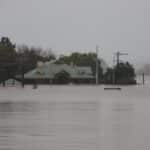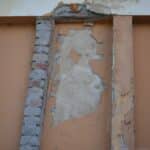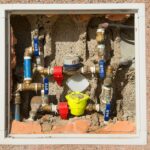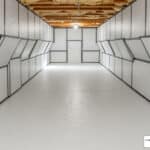Your Basement’s First Line of Defense Against Moisture
A basement concrete slab moisture barrier is a protective layer installed beneath your concrete floor to stop water vapor from rising up through the porous concrete and into your basement.
Quick Answer for Maryland Homeowners:
- What it is: A thick plastic sheet (typically 10-15 mils) placed under concrete slabs.
- How it works: Blocks water vapor from the soil from entering your basement.
- Why you need it: Prevents mold, protects flooring, stops musty smells, and can block radon gas.
- Professional installation: Required for proper sealing and integration.
Here’s something most homeowners don’t realize: your concrete basement floor acts like a giant sponge. Even though it looks solid, concrete is porous. Water vapor from the soil travels upward through it via capillary action. In our 70+ years serving Maryland families, we’ve learned that the best time to address this is before it becomes a major problem.
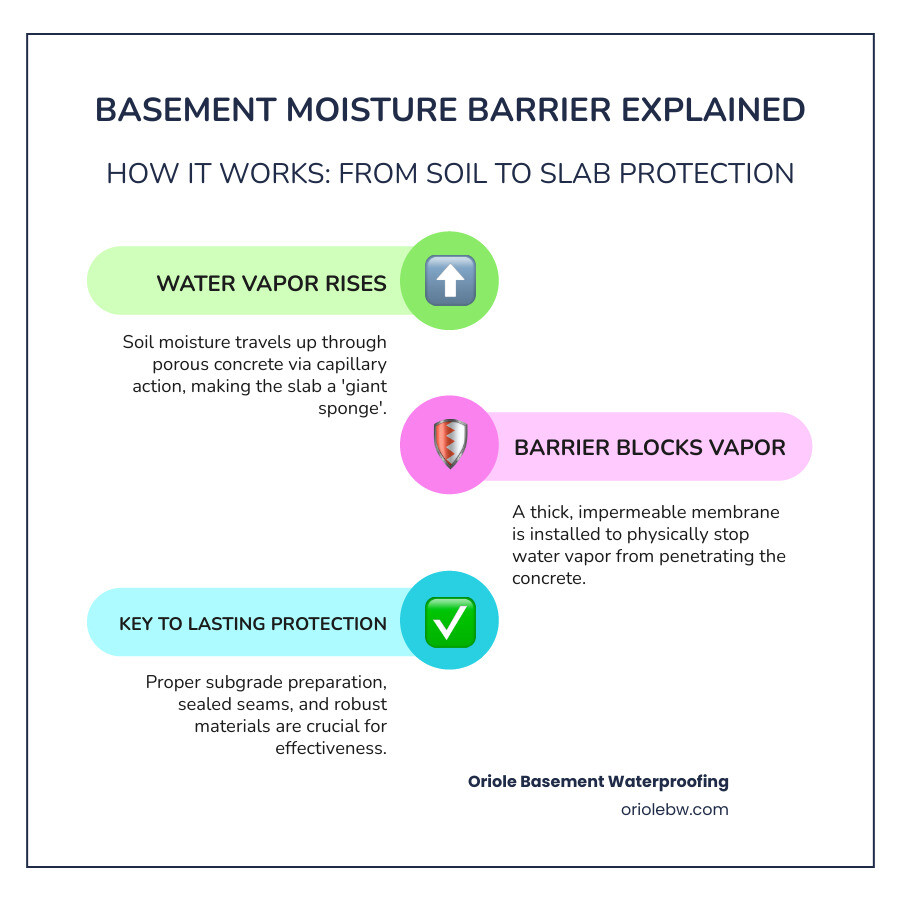
Simple guide to basement concrete slab moisture barrier:
Why a Damp Basement Floor Is More Than Just an Annoyance
That invisible moisture from the ground sets off a chain reaction of problems. Even without a flood, the constant vapor moving through your porous concrete slab can lead to:
- Mold and Mildew: Moisture is the key ingredient for mold growth, causing musty smells and health risks.
- Damaged Flooring: Constant dampness ruins carpet, wood, and laminate, leading to costly replacement projects. A proper vapour barrier is essential.
- Poor Indoor Air Quality: A damp basement degrades your home’s indoor air quality, triggering allergies and respiratory issues.
- Radon Intrusion: A quality moisture barrier also blocks radon, a radioactive gas from the soil that is a leading cause of lung cancer.
Ignoring these issues leads to bigger, more expensive problems. As we explain in our guide on Why is Basement Waterproofing Necessary? The Risks of Skipping It, prevention is always the best approach.
What is a Basement Concrete Slab Moisture Barrier and How Does It Work?
A basement concrete slab moisture barrier is a specialized, impermeable sheet that physically separates the damp earth from your home’s foundation. It’s a true vapor barrier, offering superior, near-complete blocking of moisture. Its effectiveness is measured by a permeance rating. The lower the number, the better. Professionals use materials that meet strict industry standards like ASTM E-1745 for strength and performance.
By creating an impermeable layer, the barrier stops capillary action, protects the concrete slab itself from moisture-related damage, and keeps your finished basement space dry. This directly translates to lower humidity, less mold, and a healthier indoor environment.
The Professional Process for a Basement Concrete Slab Moisture Barrier
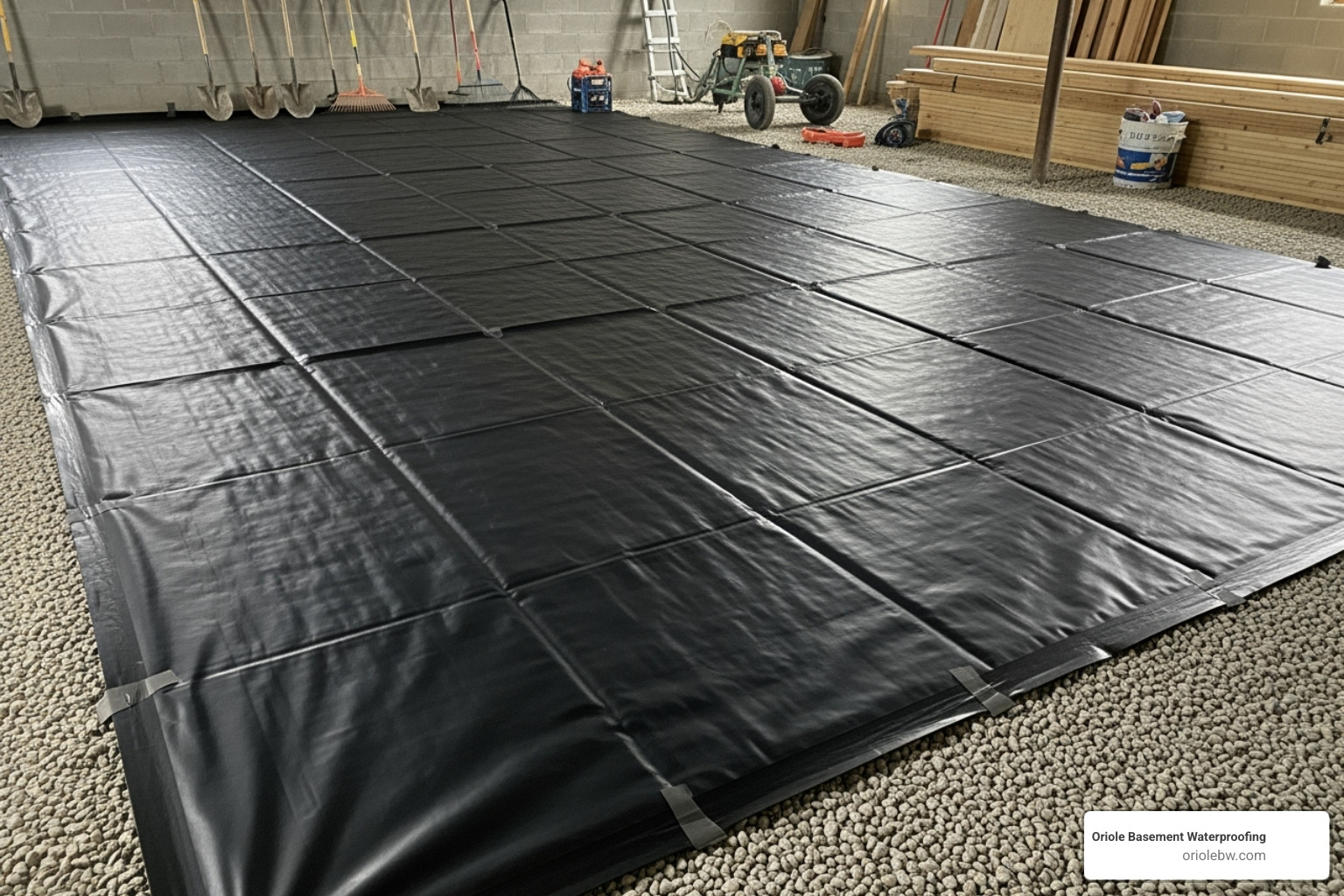
Installing a basement concrete slab moisture barrier is a precision job, not a simple DIY task. Our expertise, honed over 70 years, ensures this crucial layer performs flawlessly for decades. We adhere to stringent industry guidelines to make sure your investment in a dry basement is sound.
For a general overview, you can refer to our Basement Slab Vapor Barrier Guide.
Step 1: Choosing the Right Materials for Maryland Homes
The key is selecting a high-performance barrier that meets or exceeds industry standards. The American Concrete Institute (ACI) recommends a minimum thickness of 10 mils for effectiveness.
Here’s a comparison of common material thicknesses:
| Material Thickness | Typical Use Cases & Durability | Cost (approx. per sq. ft.) |
|---|---|---|
| 6-mil Polyethylene | Minimal protection, easily punctured. Often insufficient for long-term moisture control. | 5-7 cents |
| 8-mil Polyethylene | Basic residential construction, but still prone to punctures. | 5-7 cents |
| 10-mil Barrier | Residential construction, considered minimum effective thickness by ACI. Good balance of cost and performance. | 10-15 cents |
| 15-mil Barrier | Heavy residential use, offers superior puncture resistance. | 25 cents |
| 20-mil Barrier | High-performance applications, maximum durability and moisture protection. | 30+ cents |
Note: These are approximate costs and can vary.
We prioritize materials that are at least 10-mil, and often 15-mil or more, for superior puncture resistance. A quality barrier will always meet ASTM E1745 standards, which guarantees it has been tested for performance. For more on how a quality barrier protects your home, check out our article: Basement Vapor Barrier Protects Against Mold, Rot, and Costly Repairs.
Step 2: The Critical Installation Steps Pros Never Skip
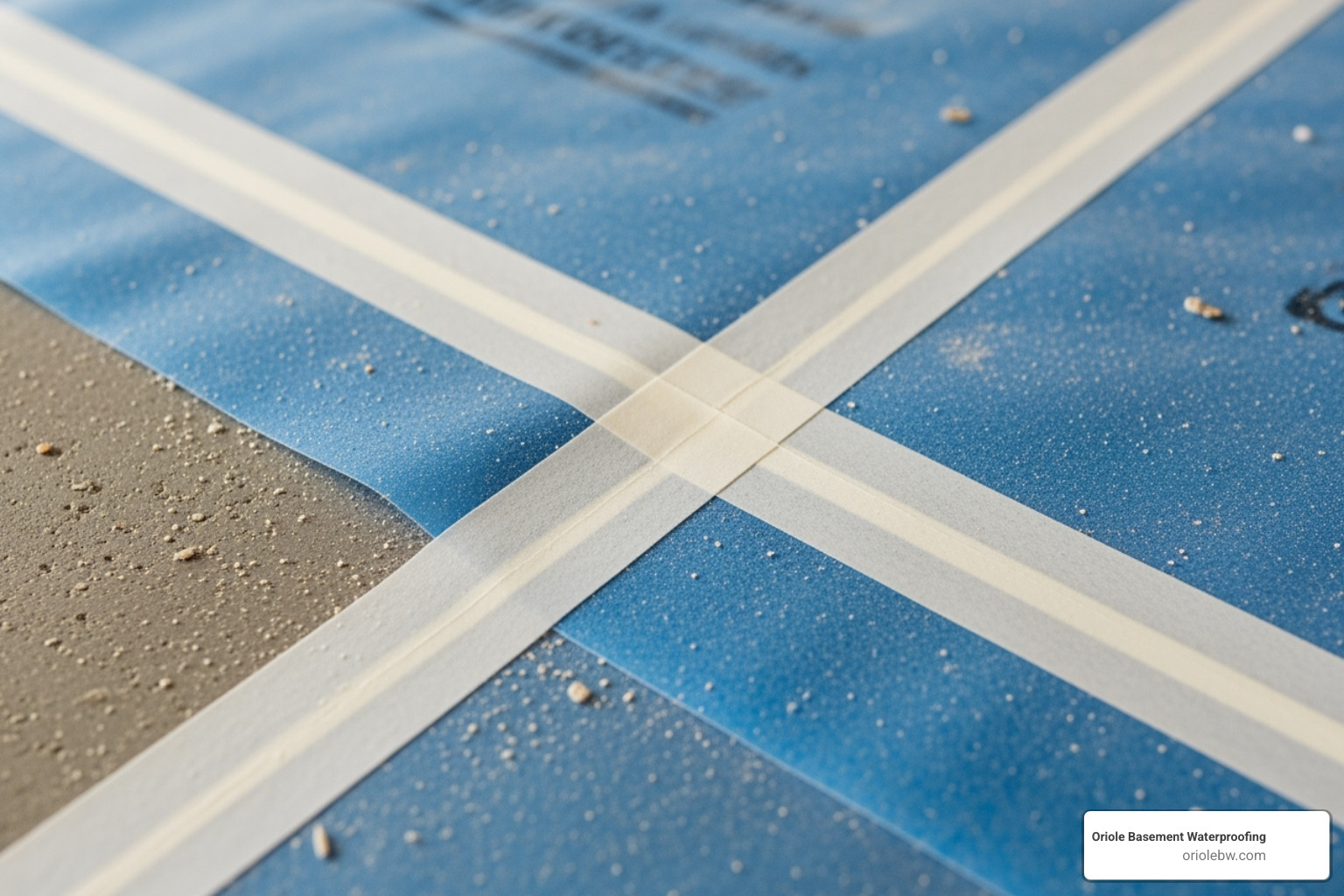
Even the best material can fail if not installed correctly. Our team follows a meticulous process to protect every inch of your basement slab.
Critical steps include:
- Subgrade Preparation: The ground must be compacted, smooth, and completely free of sharp objects that could cause a puncture.
- Proper Overlapping: All seams are overlapped by at least 6 to 12 inches for a continuous layer.
- Sealing All Penetrations: We carefully seal around every pipe and conduit with specialized tapes, leaving no gaps for vapor.
- Taping for a Watertight Seal: Seams are sealed with high-quality, pressure-sensitive tape to form a durable, airtight bond.
- Integrating with Wall Systems: The slab barrier must be seamlessly connected to wall waterproofing systems for complete protection.
- Careful Concrete Pour: We take extreme care during the concrete pour to avoid damaging the new barrier.
Common DIY mistakes like using thin materials or failing to seal seams can lead to costly moisture problems. If you’re seeing signs of moisture, learn what to look for in our guide: 6 Signs You Need to Get Your Basement Waterproofed.
Step 3: Beyond Moisture: Added Protection from a Quality Barrier
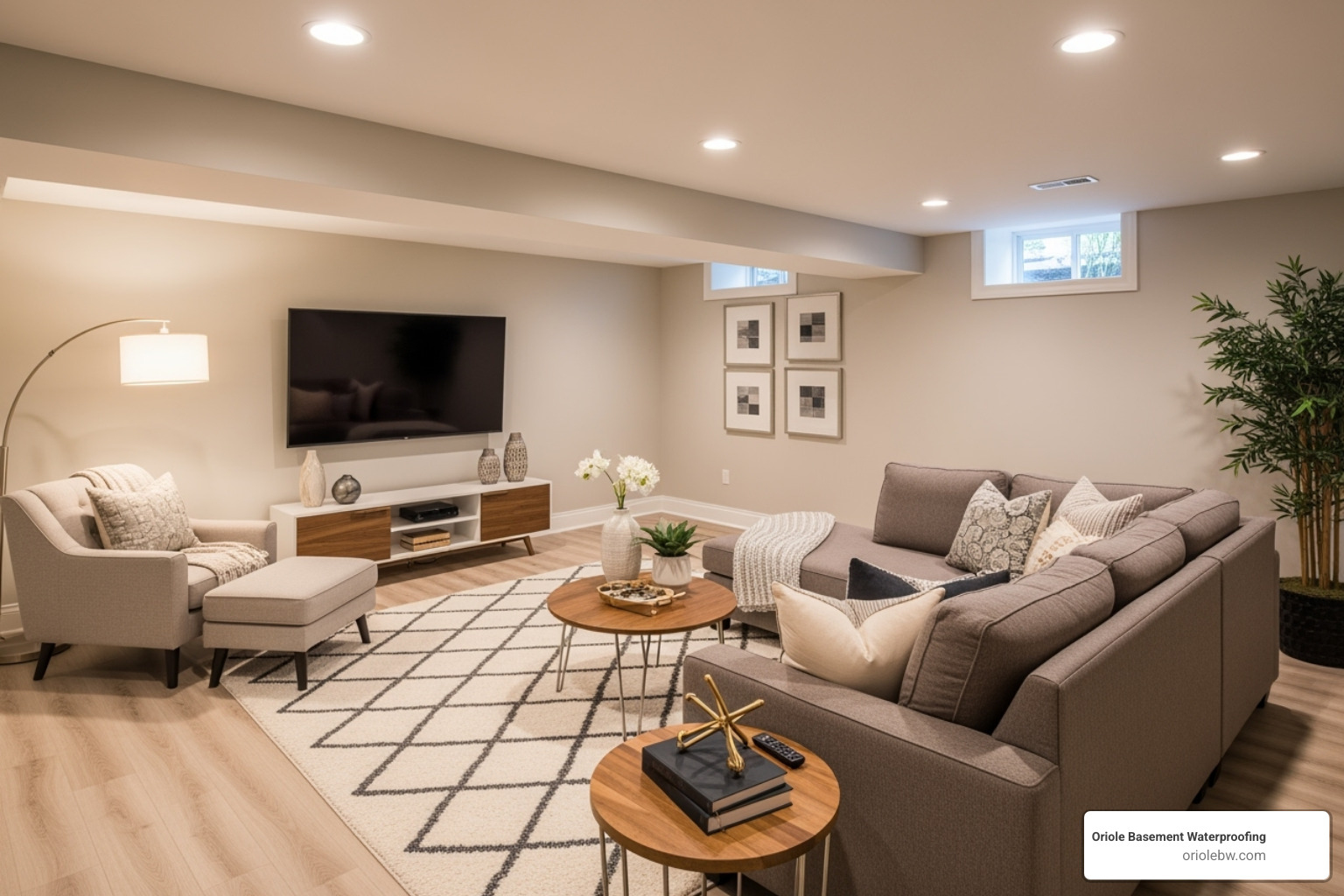
A professionally installed basement concrete slab moisture barrier is a multifaceted investment in your home’s health and value.
A quality barrier also provides:
- Radon Mitigation: A sealed barrier is a highly effective defense against radon gas.
- Flooring Warranty Protection: Many flooring manufacturers require a vapor barrier to validate their warranties.
- Efflorescence Prevention: It stops the ugly white, powdery salt deposits from forming on your concrete.
- Improved Energy Efficiency: A dry basement means lower humidity, so your HVAC system works less, saving energy.
- Healthier Air Quality: A dry slab prevents mold growth and odors, contributing to a healthier home.
These benefits are also a core focus of our Crawl Space Encapsulation services, where controlling moisture is paramount.
Secure Your Foundation with a Flawless Installation
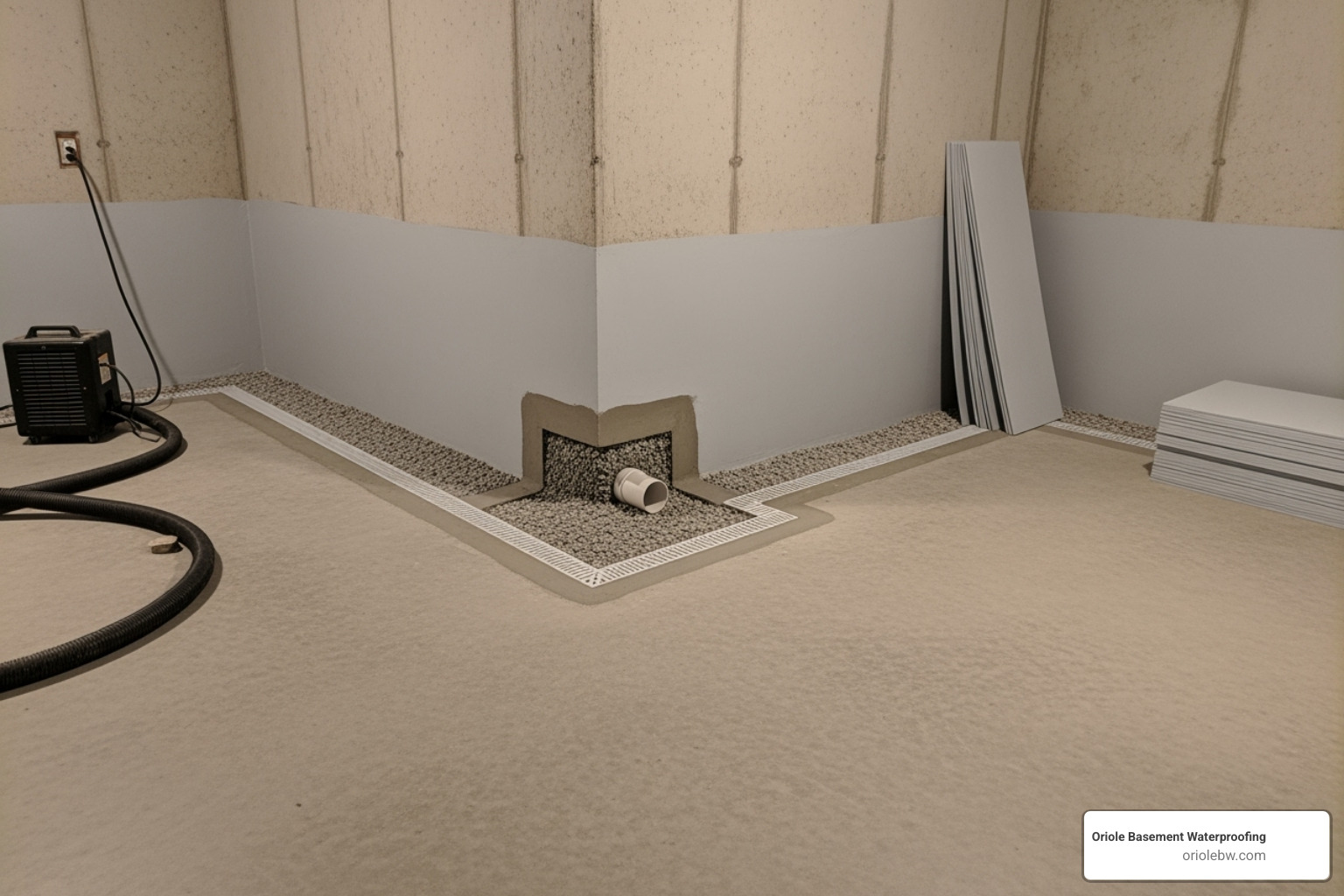
After seven decades in the waterproofing business, we know this for sure: the lifetime value of a properly installed basement concrete slab moisture barrier far outweighs the upfront investment. We’ve seen too many Baltimore basements where an initial shortcut led to thousands in damage later.
Think about the cost of failure: replacing water-damaged flooring can cost thousands, and professional mold remediation can be even more expensive. A quality moisture barrier installed by an expert is an investment in preventing these headaches.
Our professional expertise makes all the difference. In our 70+ years serving families across Baltimore City, Baltimore County, and Harford County, we’ve seen every moisture challenge Maryland basements can offer. We don’t just install a barrier; we provide comprehensive solutions that integrate with your home’s systems for decades of worry-free performance.
We stand behind every installation with our lifetime transferable guarantee on all foundation and encapsulation work. This adds lasting value to your home.
Moisture problems only get worse over time. That damp spot or musty smell is a warning sign. Don’t let unseen moisture compromise your home’s integrity or your family’s well-being.
Ready to secure your foundation with a flawless installation? Get a free inspection for your Baltimore home and let our expert team provide a custom solution for a dry, healthy basement.

